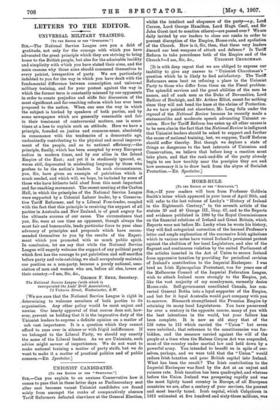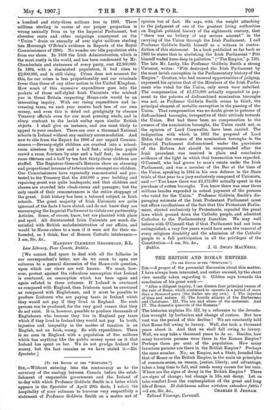HOME-RULE.
[To THE EDITOR OP THE SPECTATOV1 SIR,—If your readers will turn from Professor Goldwin Smith's letter which appeared in your issue of April 20th, and will refer to the last volume of Lecky's " History of Ireland in the Eighteenth Century," to the seventh article of the
statute 39 and 40 George chap. 67, and to the Reports and evidence published in 1896 by the Royal Commissioners on the financial relations of Ireland and Great Britain, which Reports were not before Mr. Leaky when he wrote his history, they will find categorical correction of the learned Professor's letter and ample explanation of the successive Irish agitations which in various notes have voiced Ireland's persistent protest against the abolition of her local Legislature, and also of the flagrant and continuous violation by the united Parliament of the articles inserted in the Act of Union to secure Ireland from oppressive taxation by providing for periodical revision of Ireland's contribution to the Imperial Exchequer. I was bred an Irish Episcopalian Protestant, was for years one of the Melbourne Council of the Imperial Federation League, wish to attach Ireland more strongly to the Empire, yet, like the vast majority of my countrymen, earnestly desire Home-rule. Self-government conciliated Canada, has con- verted General Botha into a loyal supporter of the Empire, and but for it loyal Australia would part company with you to-morrow. Bismarck strengthened the Prussian Empire by retaining its many local Legislatures. You have persevered for over a century in the opposite course, many of you with the best intentions in the world, but your failure bas been complete. It is now an old story that of the 158 votes to 115 which carried the " Union " but seven were unbribed ; that reference to the constituencies was for- bidden, and the measure carried against the will of the people at a time when the Habeas Corpus Act was suspended, most of the country under martial law and held down by a powerful army. You intended to benefit us in spite of our- selves, perhaps, and we were told that the "Union" would reduce Irish taxation and pour British capital into Ireland. What has been the result ? The Irish contribution to the Imperial Exchequer was fixed by the Act at an unjust and ruinous rate. Irish taxation has been quadrupled, and whereas before the Union Ireland was prospering rapidly and was the most lightly taxed country in Europe, of all European countries we are, after a century of your services, the poorest and moat heavily taxed. Irish capital, which Colquboun in 1812 estimated at five hundred and sixty-three millions, -was
a hundred and sixty-three millions less in 1893. Three millions sterling in excess of our proper proportion is wrung annually from us by the Imperial Parliament, but absentee rents and other outgoings consequent on the " Union" drain us annually of over eight millions sterling (see Murrough O'Brien's evidence in Reports of the Royal Commissioners of 1896): No wonder our idle population ebbs from our shore. In 1859 the Irish Administration, which is the most costly in the world, and has been condemned by Mr. Chamberlain and statesmen of every party, cost £2,300,000. In 1894, with a diminished population, it bad risen to £2,600,000, and is still rising. Crime does not account for this, for our crime is less proportionably and our criminals fewer than those of any other nation in the United Kingdom. How much of this excessive expenditure goes into the pockets of those self-styled Irish Unionists who mislead you in Great Britain respecting Home-rule would be an interesting inquiry. With our rising expenditure and in- creasing taxes, we each year receive back less of our own money, and even this is doled out grudgingly by obscure Treasury officials even for our most pressing needs, and in sharp contrast to the lavish outlay upon similar British objects. I shall give an instance, and one most likely to appeal to your readers. There are over a thousand National schools in Ireland without any sanitary accommodation. And now to cite from the Report for 1906 of our unpaid Commis- sioners :—Seventy-eight children are crushed into a school- room nineteen by nine and a half feet ; sixty-four pupils crowd a room fourteen by nine and a half feet; in another room thirteen and a half by ten feet thirty-three children are stuffed. The Registrar-General's Returns show an alarming and proportional increase of tuberculosis amongst our children. Our Commissioners have repeatedly remonstrated and pro- tested to the Treasury that the £40,000 a year building and repairing grant was quite inadequate, and that children and classes are crowded into cloak-rooms and passages ; but the only result of their remonstrances is the entire stoppage of the grant. Irish history has been a tabooed subject in Irish schools. The great majority of Irish Unionists are quite ignorant of the facts I have stated, and do not know they are encouraging the Imperial Parliament to violate our partnership Articles. Some, of course, know, but are placated with place ' and spoil. All disinterested Irish Unionists are much dis- satisfied with British maladministration of our affairs, and would be Home-rulers to a man if it were not for their un- founded, as I think, fear of Roman Catholic intolerance.— I am, Sir, &c.,
[We cannot find space to deal with all the fallacies in our correspondent's letter, nor do we mean to open our columns to a general discussion of the Home-rule question, upon which our views are well known. We must, how- ever, protest against the ridiculous assumption that Ireland is overtaxed, an assumption which has been again and again refuted in these columns. If Ireland is overtaxed as compared with England, then Irishmen must be overtaxed as compared with Englishmen, and it must be possible to produce Irishmen who are paying taxes in Ireland which they would not pay if they lived in England. No such persons can be produced, for the very good reason that they do not exist. It is, however, possible to produce thousands of Englishmen who because they live in England pay taxes which if they lived in Ireland they would not pay. In truth, injustice and inequality in the matter of taxation is an English, not an Irish, wrong. So with expenditure. There is no area in England with a population of five millions which has anything like the public money spent on it that Ireland has spent on her. We do not grudge Ireland the money, but the fact remains as we have stated it.—En. Spectator.]















































 Previous page
Previous page